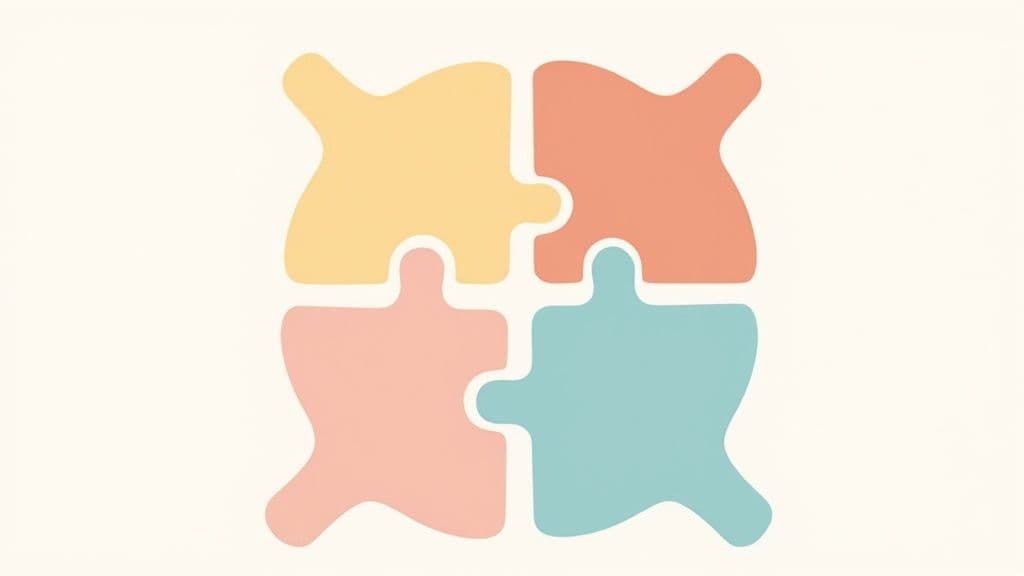Struggling to define your purpose? This guide explains “what are core values examples” and shows seven practical pillars—Integrity, Innovation, Respect, Excellence, Accountability, Collaboration, Customer Focus—to act as your internal compass. Use the examples and quick steps to identify your top 3–5 values and apply them in everyday choices.
October 17, 2025 (4mo ago) — last updated February 15, 2026 (14d ago)
Core Values: 7 Pillars to Guide Your Life
Explore seven core values—Integrity, Innovation, Respect, Excellence, Accountability, Collaboration, Customer Focus—and practical steps to live a purpose-driven life.
← Back to blog
Core Values: 7 Pillars to Guide Your Life
Summary: Struggling to define your purpose? Explore seven core values examples to find clarity and build an authentic life aligned with your true self.
Introduction
Struggling to define your purpose? This guide answers the question “what are core values examples” by moving beyond lists to show how values shape real choices. These seven practical pillars—Integrity, Innovation, Respect, Excellence, Accountability, Collaboration, and Customer Focus—serve as an internal compass to help you design a more intentional life. Use the examples and simple action steps to identify your top 3–5 values and practice them daily.
1. Integrity: The Foundation of Trust
Integrity isn’t just about telling the truth; it’s living in alignment with your principles even when it’s difficult. It’s the quiet commitment to do the right thing, ensuring actions consistently mirror words. A person with integrity builds a life on a solid foundation of trust1.
Living Integrity
Integrity reduces internal conflict and self-doubt. When your actions align with your beliefs, you create self-trust, the bedrock for decisions and relationships.
Key insight: True integrity is tested in small, everyday choices when no one is watching.
This value shapes self-worth and how others perceive you. Without it, values like compassion or ambition can feel hollow.
How to Cultivate Integrity
- Conduct a “say–do” audit for a week. Each evening, note what you said you’d do and what you actually did. Observe gaps without judgment.
- Define 3–5 non-negotiable principles and review them daily.
- Practice small acts of honesty to build the muscle for larger challenges.
For a structured way to identify principles that matter most, see our personal-values guide: /blog/personal-values.
2. Innovation: The Engine of Progress
Innovation is more than a single creative spark; it’s a disciplined pursuit of what’s next. It means challenging the status quo, embracing change, and learning from failure.

Living Innovation
Innovation is a catalyst for growth and relevance. In a fast-moving world, the ability to adapt and create turns obstacles into opportunities and encourages continuous improvement.
Key insight: Innovation often arises from a culture of curiosity—asking “What if?” and “Why not?” in everyday situations.
How to Cultivate Innovation
- Schedule weekly “20% time” to explore passion projects.
- Keep an idea quota to exercise your creative muscle.
- Build a diverse board of advisors to challenge assumptions.
Align innovation with your identity using tools like the Life Purpose App: https://lifepurposeapp.com/blog/how-to-discover-your-core-values.
3. Respect: The Gateway to Connection
Respect recognizes another person’s inherent worth. It means valuing diverse perspectives, creating inclusive spaces, and treating others as you wish to be treated.

Living Respect
Respect lubricates social interactions. Approaching others with genuine respect de-escalates conflict and opens the door to collaboration. When people feel seen and valued, they’re more likely to reciprocate.
Key insight: True respect shows when you disagree: listen to understand, not just to reply.
How to Cultivate Respect
- Practice active listening and paraphrase what you heard before responding.
- Assume positive intent to avoid jumping to negative conclusions.
- Seek out different perspectives through books, media, or conversations.
Build emotional intelligence skills at: https://lifepurposeapp.com/blog/how-to-build-emotional-intelligence.
4. Excellence: The Commitment to Mastery
Excellence isn’t perfection; it’s a continual commitment to deliver your best and raise your standards. It turns routine tasks into opportunities for improvement.

Living Excellence
Excellence drives growth and resilience. It’s the habit of doing the extra proofread, following up thoughtfully, and practicing a skill a little longer each day.
Key insight: Excellence is found in the details.
How to Cultivate Excellence
- Use a “Plus One” rule: do one extra thing to elevate quality.
- Define quality benchmarks by studying leaders in your field.
- Schedule a weekly 30-minute Kaizen review to improve incrementally.
Improve discipline and consistency at: https://dontlooktrash.com/blogs/main-character/how-to-improve-discipline.
5. Accountability: The Engine of Ownership
Accountability is taking ownership of your actions and outcomes without shifting blame. It’s asking, “What can I do to fix this?” rather than “Whose fault is this?”
Living Accountability
Accountability turns you from passenger to driver of your life. Accepting responsibility reclaims the power to change your circumstances and encourages learning from mistakes2.
Key insight: Accountability is response-ability; it treats mistakes as lessons, not punishments.
How to Cultivate Accountability
- Monitor your language for blaming phrases and reframe to action-focused statements.
- Set clear ownership zones where you define success and communicate your commitment.
- Conduct after-action reviews: what did you intend, what happened, and what will you change next time?
Explore how personal responsibility fits into your life at: https://lifepurposeapp.com/blog/how-to-discover-your-core-values.
6. Collaboration: The Power of Collective Genius
Collaboration is the belief that a collective mind outperforms individuals. It prioritizes open communication, shared knowledge, and mutual support.
Living Collaboration
Collaboration amplifies potential. Diverse perspectives strengthen outcomes—companies with greater diversity are more likely to outperform their peers3. A collaborative environment encourages psychological safety and co-creation.
Key insight: True collaboration is co-creation. It thrives when people feel safe to share nascent ideas.
How to Cultivate Collaboration
- Use “Plus-One” brainstorming: add a constructive element before critiquing an idea.
- Create a shared-knowledge hub for projects so information becomes a collective asset.
- Seek cross-functional input and listen without defending your own view.
Build communication skills at: https://lifepurposeapp.com/blog/how-to-improve-communication-skills.
7. Customer Focus: The Heart of the Enterprise
Customer focus places the customer at the center of every decision. It means understanding needs deeply, exceeding expectations, and building lasting relationships. Small improvements in retention can dramatically boost profitability4.
Living Customer Focus
Customer focus shifts the question from “What can we sell?” to “What does the customer need?” Empowering frontline employees to resolve issues on the spot shows this value is lived, not just stated.
Key insight: Empowered employees reflect true customer focus—policies that trust frontline judgment make the value real.
How to Cultivate Customer Focus
- Map the customer journey and identify pain points and moments of delight.
- Empower the frontline with a “make it right” policy.
- Share customer stories at meetings to keep the customer’s voice present.
For a tool that links personal purpose with professional priorities, try the Life Purpose App: https://lifepurposeapp.com.
Core Values Comparison: 7 Key Examples
| Core Value | Implementation Complexity | Resource Requirements | Expected Outcomes | Ideal Use Cases | Key Advantages |
|---|---|---|---|---|---|
| Integrity | Moderate | Low–Moderate | High trust and reputation | Ethical leadership, brand reputation | Builds trust, reduces risk |
| Innovation | High | High | Market adaptability, new products | Tech, R&D, competitive markets | Sustains competitive edge |
| Respect | Moderate | Moderate | Inclusive culture, fewer conflicts | Diverse organizations, global teams | Enhances engagement |
| Excellence | High | Moderate–High | Superior quality, brand loyalty | Quality-driven industries | Drives continuous improvement |
| Accountability | Moderate–High | Moderate | Increased productivity, reliability | Performance-driven environments | Builds dependability |
| Collaboration | Moderate–High | Moderate | Innovative solutions, stronger teams | Cross-functional projects | Leverages diverse perspectives |
| Customer Focus | Moderate | Moderate | Customer loyalty and satisfaction | Service industries | Informs product development |
From Examples to Action: Defining Your Personal Compass
We’ve moved beyond definitions to practical examples of what core values look like in action. Use these pillars as a launchpad, then test them against your life experiences and aspirations. Identify your top 3–5 guiding principles and write a personal definition for each.
Synthesizing Your Personal Code
- Reflect on moments when you felt most proud or aligned. Which values were present?
- Prioritize 3–5 values and define what each means to you personally.
- Integrate deeper frameworks like Dan Millman’s The Life You Were Born to Live or tools such as the Life Purpose App to align values with your life themes.
The Power of a Value-Driven Life
Living by clear core values gives clarity in confusion, strength in adversity, and purpose in daily choices. Values evolve as you grow; revisit them and refine your personal compass as needed.
Questions & Answers
Q: What are core values and why do they matter?
A: Core values are the guiding principles that shape decisions, behavior, and priorities. They matter because they create consistency, build trust, and help you act with purpose.
Q: How do I identify my top core values?
A: Reflect on peak moments, list recurring themes, then prioritize 3–5 values. Write a personal definition for each to make them actionable.
Q: How do I use values to make better choices?
A: Use your top values as a filter: when faced with a decision, ask which option aligns most closely with your defined values and choose accordingly.
Discover Your Life Purpose Today!
Unlock your true potential and find your life’s purpose.
